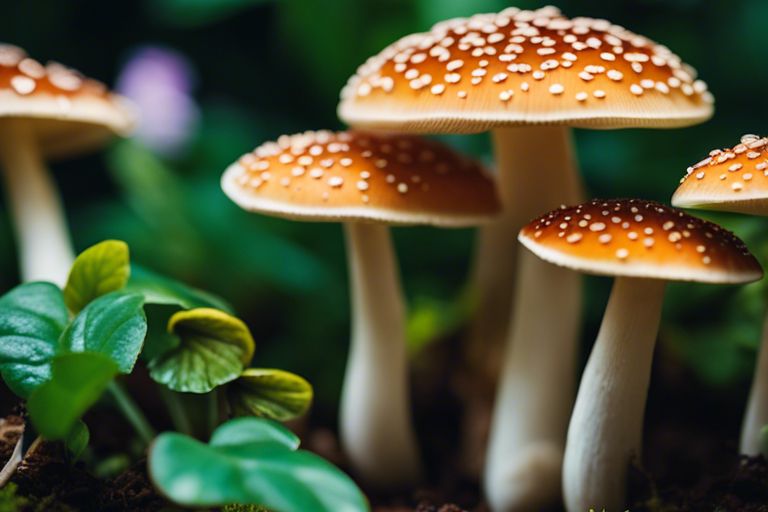Most fascinating it is to observe mushrooms sprouting in your garden bed, seemingly out of nowhere. Fear not, for these fungi are a sign of a healthy ecosystem at work beneath the soil’s surface. Mushrooms thrive in damp environments where decaying organic matter is plentiful, breaking down nutrients and enriching the soil in the process. In this blog post, we will investigate into the reasons behind the sudden appearance of mushrooms in your garden bed and what it indicates about the health of your garden.
Key Takeaways:
- Mushrooms indicate a healthy ecosystem: The presence of mushrooms in your garden bed is a sign of a thriving and balanced ecosystem. These fungi help break down organic matter, enriching the soil and promoting plant growth.
- Moisture and organic matter are key factors: Mushrooms thrive in damp environments and feed on decaying organic materials such as wood, leaves, or compost. Ensure proper drainage and balanced levels of organic matter to control mushroom growth.
- Harvest carefully and enjoy the benefits: While some gardeners may find mushrooms unsightly, remember that they play a vital role in the garden’s health. If you choose to remove them, do so carefully to avoid disturbing the soil ecosystem, and consider the benefits they bring to your plants.
The Perfect Environment
Moisture and Humidity
An imperative factor for mushroom growth in your garden bed is the presence of adequate moisture. Mushrooms thrive in damp environments where there is high humidity. Excessively wet conditions can encourage their growth, so it’s crucial to maintain a balance to prevent an overabundance of fungi.
Soil Composition and pH Levels
Moisture isn’t the only requirement for mushrooms to flourish in your garden bed. The soil composition and pH levels also play a significant role in creating the ideal environment for their growth. Mushrooms prefer soil that is rich in organic matter and has a slightly acidic to neutral pH level.
In such conditions, the mushrooms can effectively break down organic matter, aiding in the decomposition process and releasing nutrients back into the soil. Ensuring the right balance of these factors can help control the population of mushrooms in your garden bed.

The Culprits Behind the Growth
Little did you know that the mushrooms sprouting in your garden bed are the work of fungi lurking beneath the soil’s surface. These hidden organisms play a crucial role in the ecosystem, breaking down organic matter and recycling nutrients back into the soil.
Types of Mushrooms Commonly Found in Gardens
On closer inspection, you’ll likely come across various types of mushrooms in your garden bed. Perceiving the differences between them can help you understand their role in the ecosystem.
| 1. Amanita Muscaria | 2. Shiitake |
| 3. Oyster | 4. Chanterelle |
| 5. Morel |
How Fungi Spores Spread and Colonize
Gardens provide the perfect environment for fungi spores to spread and colonize. With the right combination of moisture, organic matter, and temperature, these spores can germinate and form networks of mycelium beneath the soil.
Fungi release spores into the air, which can then land in suitable environments like your garden bed. Once settled, these spores germinate and grow into mycelium, the branching network that eventually gives rise to mushrooms when conditions are favorable.
Removing and Preventing Mushroom Growth
Physical Removal Methods
Your first line of defense against unwanted mushrooms in your garden bed is physical removal. This involves manually plucking the mushrooms out of the soil, making sure to remove not only the caps but also the entire base and root system. Be thorough in this process to prevent regrowth.
Chemical Control Options
Physical methods may not always be sufficient in preventing mushroom growth. In such cases, you can turn to chemical control options. Fungicides containing ingredients like chlorothalonil or thiophanate-methyl can be effective in treating mushroom infestations. Follow the instructions on the product label carefully to ensure safe and effective application.
Another important aspect to consider when using chemical control options is the impact on the surrounding environment. Be cautious when applying fungicides to avoid harming beneficial organisms in the soil and nearby plants. Always opt for eco-friendly options whenever possible to minimize negative consequences.
Conclusion
To wrap up, finding mushrooms growing in your garden bed is a natural occurrence that indicates a healthy ecosystem. These fungi play a vital role in breaking down organic matter and enriching the soil, contributing to the overall health of your garden. While they may surprise you at first, mushrooms should be welcomed as beneficial allies in your gardening endeavors.
FAQ
Q: Why are mushrooms growing in my garden bed?
A: Mushrooms are fungi that thrive in damp, dark environments with organic matter to feed on. If you see mushrooms in your garden bed, it’s a sign that the conditions are just right for their growth.
Q: Are the mushrooms in my garden bed harmful?
A: While most mushrooms in your garden bed are harmless, some can be toxic if ingested. It’s best to err on the side of caution and avoid consuming any mushrooms you find in your garden bed.
Q: How can I get rid of mushrooms in my garden bed?
A: To get rid of mushrooms in your garden bed, you can manually remove them by gently pulling them out. It’s also helpful to improve drainage in the area and reduce moisture to create less favorable conditions for mushroom growth.
Q: Can mushrooms in my garden bed benefit my plants?
A: Yes, mushrooms play a vital role in the ecosystem by breaking down organic matter and releasing nutrients that can benefit your plants. However, if you notice an overabundance of mushrooms, it may indicate an imbalance in your garden bed.
Q: How can I prevent mushrooms from growing in my garden bed?
A: To prevent mushrooms from growing in your garden bed, ensure good drainage, reduce moisture levels, and avoid over-mulching. Regularly aerating the soil and maintaining a balanced ecosystem will also help keep mushrooms at bay.
